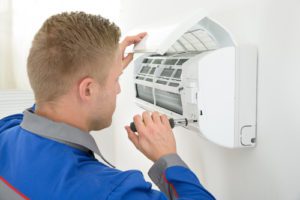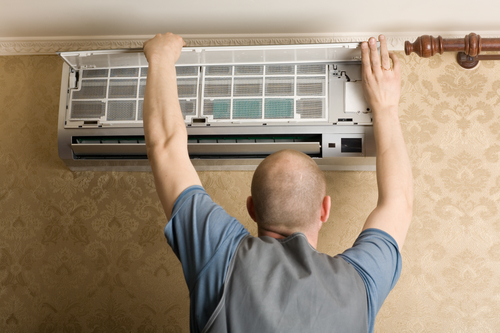Maintenance is key if you want to extend the life span of your air conditioning unit. Air conditioning maintenance as it is commonly called refers to activities that will seek to eliminate the possibility of any malfunctions.
In reality, your air conditioner can malfunction on one of the hottest days, leaving you high and dry. Your air conditioner will run into difficulty when its components are being worked too hard. Dust and other micro particles can get stuck in the unit and cause it to malfunction as well.
In order to stop your air conditioner from malfunctioning, you would need to have frequent air conditioner maintenance, so that your mind can be at ease throughout the year. What if you have guest over? Would you want them to rate your home negatively because they suffered due to a malfunctioning AC system.

How Air Conditioning Maintenance Works
An air conditioner maintenance visit comprises of a full and extensive examination of the vital components of your HVAC system.
After an in-depth examination, your technician will let you know what needs to be instantly repaired. So that your air conditioning system will not be a nuisance and malfunctions unexpectedly.
Things Your Technician Will Do
Cleaning the parts of your air conditioner system can aid in enhancing its productivity and nip the repairs in the bud. For example, a dusty coil may prevent heat exchange, which can cause the mechanical parts to work too hard. But with every maintenance visit, your professional technician would know how to keep everything in top shape.
Some of your air conditioner system’s parts may require a hasty change before your air conditioning technician goes. Some of the changes may include strengthening electrical connections, reinforcing bent coils and fastening unsecured components.
What’s In It For You
You should schedule your yearly air conditioning maintenance. If not you will discover that you can have numerous hitches to deal with. You may have to spend more resources on your monthly energy bill than is really required. Do you really want this to happen? Make a wise choice and contact Valley Comfort Heating and Air.. Don’t sweat – our professional team will make it all happen by ensuring your AC unit is running perfectly.
You can save on money because a maintenance repair can prolong the life of your air conditioner system and stop the demands of your repairs. Its a smart move to capitalize on repair savings.
Frequently Asked Questions
1. Why is air conditioning maintenance important?
Regular maintenance prevents malfunctions and extends the lifespan of your AC unit, ensuring it runs efficiently.
2. How often should I schedule air conditioning maintenance?
It’s recommended to schedule maintenance at least once a year to keep your system in top shape.
3. What happens during an AC maintenance visit?
A technician will inspect, clean, and repair vital components to ensure the system operates smoothly and efficiently.
4. How does dust affect my air conditioner?
Dust can clog the system, reducing airflow and forcing components to work harder, which can lead to malfunctions.
5. Can maintenance reduce my energy bills?
Yes, regular maintenance can improve efficiency, reducing energy consumption and potentially lowering your bills by up to 15%.
6. What components are typically checked during maintenance?
Technicians check the coils, electrical connections, refrigerant levels, and other essential parts of your AC system.
7. How does cleaning the coils improve performance?
Clean coils allow for better heat exchange, ensuring the system doesn’t overwork and improves cooling efficiency.
8. What happens if I skip maintenance?
Skipping maintenance can lead to breakdowns, increased energy bills, and more expensive repairs in the long run.
9. Can maintenance prevent sudden breakdowns?
Yes, routine checkups help detect potential issues early, reducing the chance of your AC breaking down unexpectedly.
10. How can maintenance save money on repairs?
By addressing small issues early, maintenance prevents costly repairs later, extending the lifespan of your AC unit.



